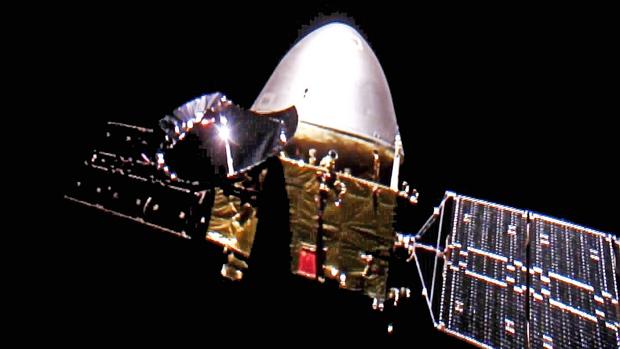 China's Tianwen 1 Mars probe is seen in its first selfies in space on Oct 1, 2020. (PHOTO / XINHUA)
China's Tianwen 1 Mars probe is seen in its first selfies in space on Oct 1, 2020. (PHOTO / XINHUA)
China's Tianwen 1 Mars probe is set to enter the orbit of the red planet around Feb 10, two days before Chinese New Year, according to China Aerospace Science and Technology Corp, the nation's leading space contractor.
The State-owned conglomerate said in a statement on Wednesday afternoon that the spacecraft will conduct a "braking" operation to decelerate and make sure it will be captured by Martian gravity.
Tianwen 1 has flown for 196 days and has traveled more than 450 million kilometers on its journey to Mars
Tianwen 1 has flown for 196 days and has traveled more than 450 million kilometers on its journey to the planet. It is now around 170 million km from Earth. Depending on the two planets' orbits, Mars is between 55 million km and 400 million km from Earth.
ALSO READ: Travelling 400m km, China's Mars probe heads for red planet
Bao Weimin, director of science and technology at China Aerospace Science and Technology Corp and an academician of the Chinese Academy of Sciences, said the braking operation will be crucial to the mission's success because if it fails, the probe will fly past Mars and become a "stray craft" in the solar system.
During the operation, the guidance, navigation and control systems will play leading roles, as they will be responsible for calculating and adjusting each maneuver, he said.
Tianwen 1, the country's first independent Mars mission, was launched by a Long March 5 heavy-lift carrier rocket on July 23 from the Wenchang Space Launch Center in Hainan province, opening the nation's planetary exploration program.
The China National Space Administration previously said that if everything goes according to schedule, the 5 metric ton probe, which consists of two major parts-the orbiter and the landing capsule-will travel more than 470 million km before entering Martian orbit, when it will be 193 million km from Earth.
READ MORE: Mars probe Tianwen 1 makes deep-space maneuver
The spacecraft has already made three midcourse corrections and a deep-space orbital maneuver.
The mission's ultimate goal is to soft-land a rover in May on the southern part of Mars' Utopia Planitia-a large plain within Utopia, the largest recognized impact basin in the solar system-to conduct scientific surveys.


